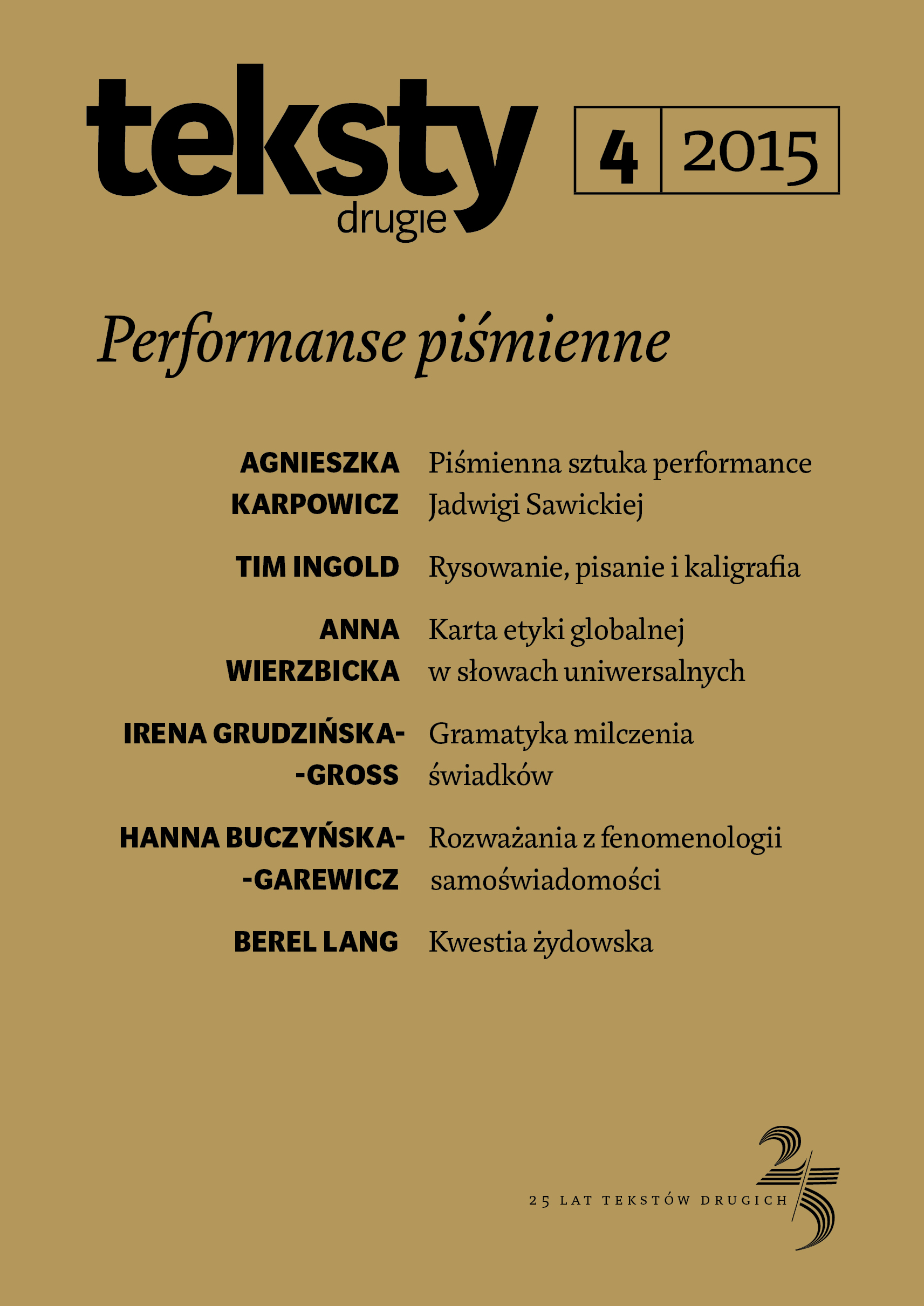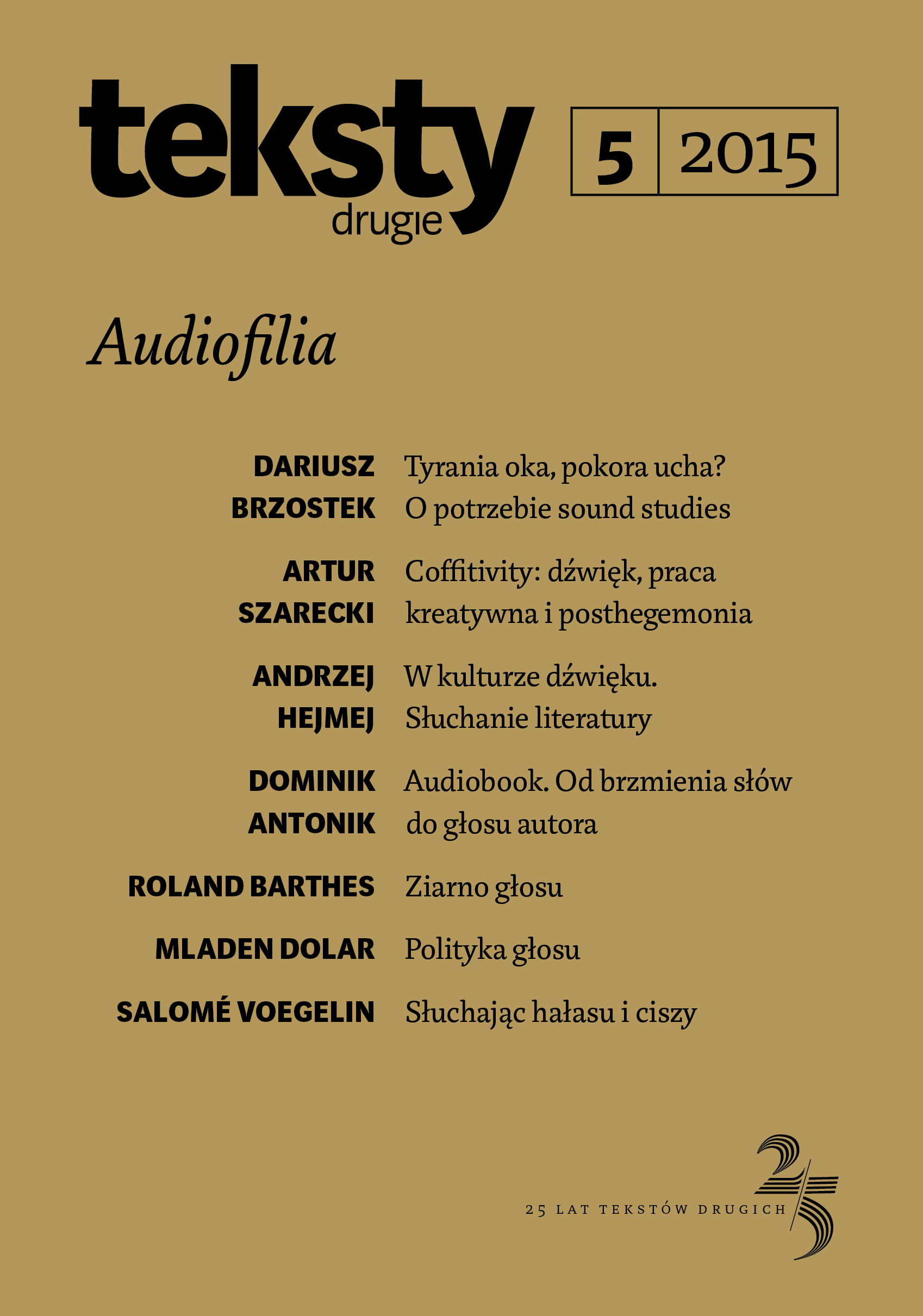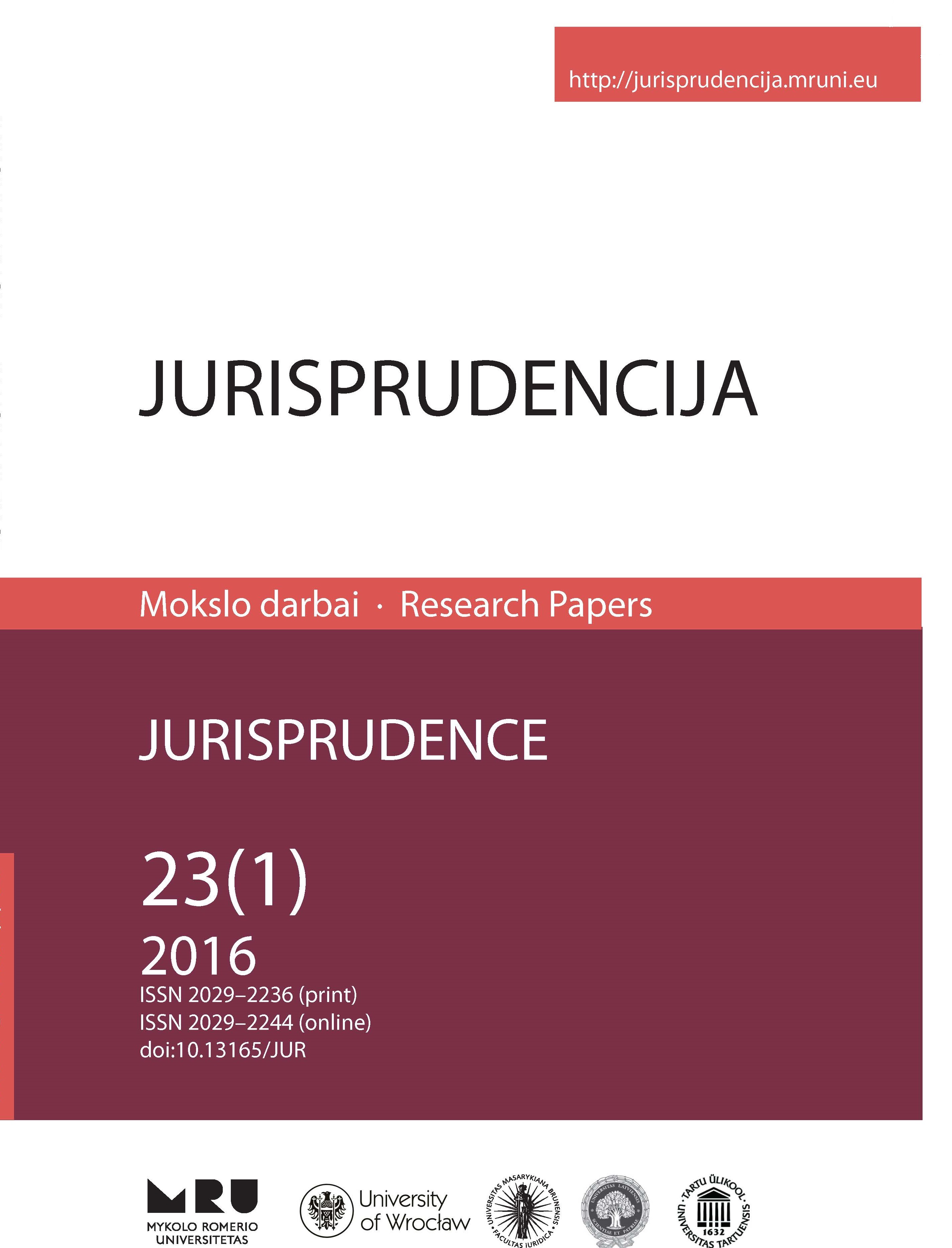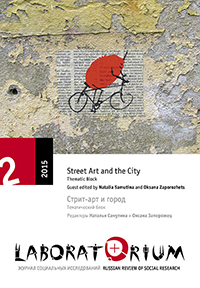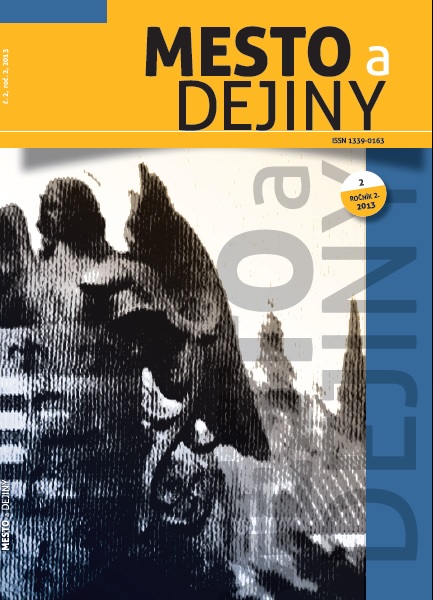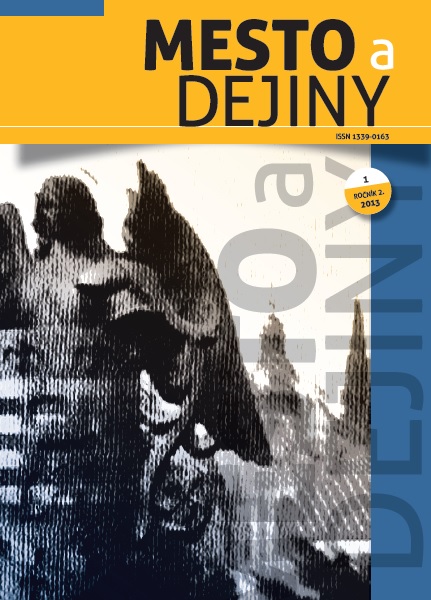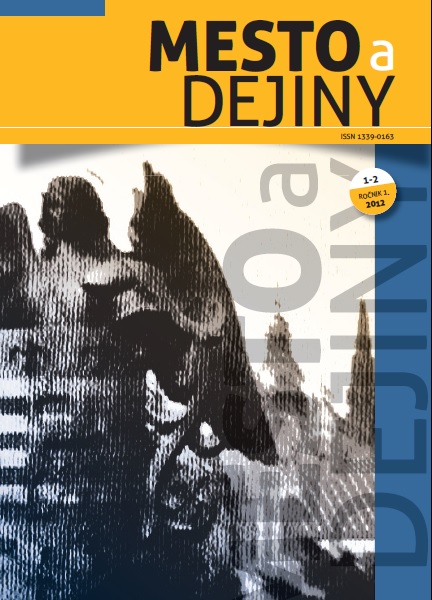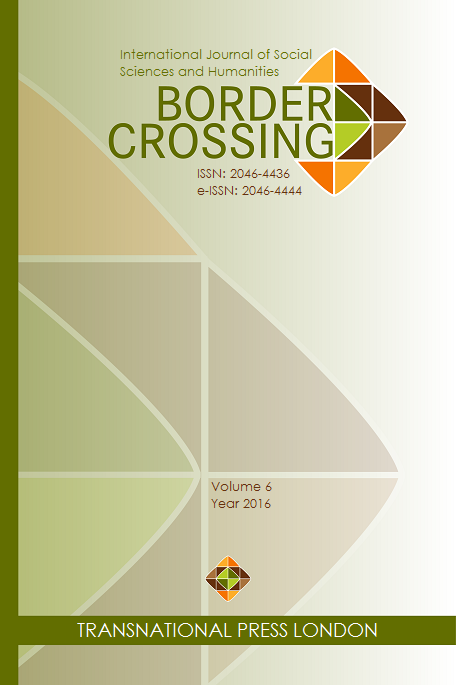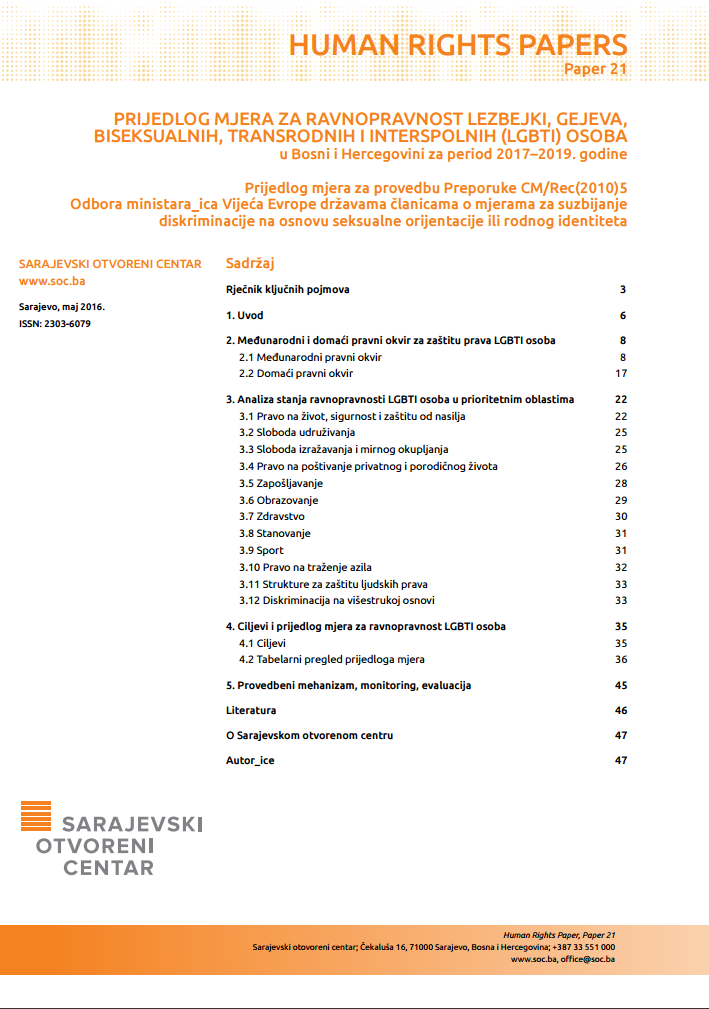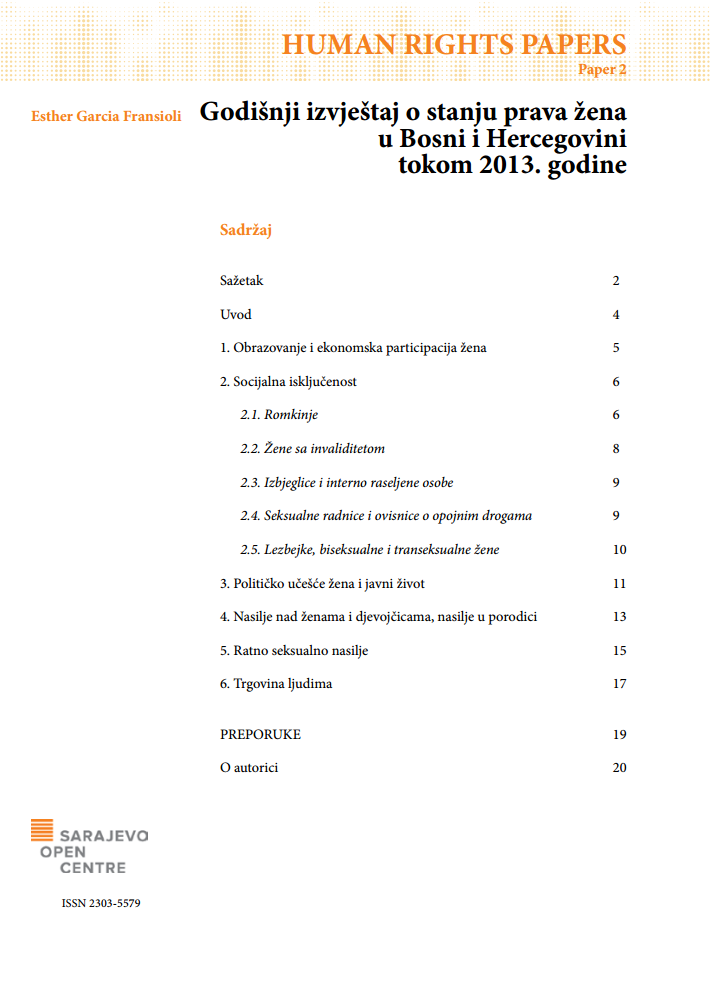Author(s): Vladana Vasić,Saša Gavrić,Emina Bošnjak / Language(s): Bosnian
Issue: 21/2016
Obaveza Bosne i Hercegovine i njenih entiteta, Republike Srpske i Federacije BiH, da izradi detaljan set mjera kojima će unaprijediti poštivanje i zaštitu ljudskih prava lezbejki, gej muškaraca, biseksualnih, transrodnih i interspolnih (LGBTI) osoba proizlazi iz njenih obaveza preuzetih potpisivanjem i ratificiranjem međunarodnih dokumenata, kao i iz članstva u međunarodnim organizacijama. Članstvo u Vijeću Evrope obavezuje je da provodi kako presude Evropskog suda za ljudska prava u Strazburu tako i preporuke koje Vijeće Evrope upućuje svojim državama članicama. Najznačajniji dokument u ovom pogledu svakako je Preporuka CM/Rec(2010)51 o mjerama za suzbijanje diskriminacije na osnovu seksualne orijentacije i rodnog identiteta koju je 31. marta 2010. godine na 1081. sastanku zamjenika ministara usvojio Odbor ministara_ica Vijeća Europe i uputio je državama članicama, a kojom se preporučuje vladama zemalja članica da: • ispitaju postojeće zakonske i ostale mjere, drže ih pod revizijom, i prikupljaju i analiziraju relevantne podatke u cilju praćenja i obeštećenja bilo koje direktne ili indirektne diskriminacije zasnovane na seksualnoj orijentaciji ili rodnom identitetu; • obezbijede usvajanje i efikasnu primjenu svih zakonodavnih i drugih mjera u borbi protiv diskriminacije zasnovane na seksualnoj orijentaciji ili rodnom identitetu kako bi se osiguralo poštovanje ljudskih prava lezbejki, gej, biseksualnih i transrodnih osoba, i promovirala tolerantnost prema njima; • osiguraju da žrtve diskriminacije budu upoznate sa pravom na efikasan pravni lijek kao i da imaju pristup državnim organima, i da mjere borbe protiv diskriminacije uključuju, gdje je potrebno, sankcije za povredu prava i adekvatnu nadoknadu žrtvama diskriminacije; • države članice treba da se u svojim zakonodavstvima, politikama i praksama rukovode principima i mjerama sadržanim u Dodatku ove Preporuke; • obezbijede odgovarajuća sredstva i akcije da se ova Preporuka, uključujući i Dodatak, prevedu i distribuiraju što je šire moguće. Ova Preporuka je prvi pravni dokument koji se na ovako detaljan način bavi diskriminacijom po ovim osnovama i koji pruža konkretne instrumente za njeno otklanjanje, te unapređenje stanja ljudskih prava i položaja LGBTI osoba u jednom društvu. Kao preporuka, ona nije pravno obavezujuća, ali se, kako je već navedeno, svaka mjera definirana njenim Dodatkom čvrsto zasniva na postojećim pravno obavezujućim međunarodnim i evropskim dokumentima vezanim za poštovanje ljudskih prava, koje BiH ima obavezu da provodi i poštuje, kao što su Evropska konvencija o ljudskim pravima i osnovnim slobodama, Evropska socijalna povelja, Međunarodna konvencija o pravima djeteta, Međunarodni pakt o građanskim i političkim pravima, Međunarodni pakt o ekonomskim, socijalnim i kulturnim pravima i drugi. Jasno je, dakle, da su država BiH, njeni entiteti Republika Srpska i Federacija BiH i Brčko distrikt BiH dužni da provode glavne elemente definirane ovom Preporukom i njenim Dodatkom. Dodatkom ove Preporuke definiraju se prioritetne oblasti, te mjere i aktivnosti koje trebaju biti poduzete u okviru svake od ovih sedam oblasti u cilju otklanjanja neravnopravnosti LGBT osoba u bosanskohercegovačkom društvu. Prioritetne oblasti definirane ovim Dodatkom podijeljene su u 11 poglavlja: I. Pravo na život, bezbjednost i zaštitu od nasilja (zločini iz mržnje i govor mržnje); II. Sloboda udruživanja; III. Sloboda izražavanja i mirnog okupljanja; IV. Pravo na poštivanje privatnog i porodičnog života; V. Zaposlenje; VI. Obrazovanje; VII. Zdravstvo; VIII. Stanovanje; IX. Sport; X. Pravo na azil; XI. Državne strukture za zaštitu ljudskih prava. Predložene mjere i aktivnosti su izvedene i definirane na osnovu navedenih principa, za BiH pravno obavezujućih evropskih i drugih međunarodnih instrumenata i detaljno razrađene u cilju adekvatnog provođenja pojedinačnih preporuka i što lakše primjene u državama članicama. Prijedlog mjera za ravnopravnost LGBTI osoba u BiH izrađen je u cilju unapređenja društvene i pravne ravnopravnosti LGBTI osoba u Bosni i Hercegovini, provođenja mjera definiranih ovom Preporukom, ali i dosljedne implementacije Zakona o ravnopravnosti spolova BiH i Zakona o zabrani diskriminacije BiH u pogledu otklanjanja diskriminacije na osnovi seksualne orijentacije, rodnog identiteta i spolnih karakteristika. Prijedlog mjera izrađen je za period od 2017. do 2019. godine i predstavlja prijedlog strateškog dokumenta koji sadrži strateške ciljeve, programe i mjere za ostvarivanje ravnopravnosti LGBTI osoba u svim oblastima društvenog života i rada, u javnoj i privatnoj sferi. Prijedlog mjera predstavlja paket aktivnosti koji bi trebao da se provede u skladu sa ustavnim nadležnostima u Bosni i Hercegovini, na nivou BiH, odnosno entitetskom, kantonalnom i lokalnom nivou, uključujući i Brčko distrikt BiH, uz poštovanje prava LGBTI osoba, te jasno definiranje obaveza i odgovornosti nadležnih institucija na svim nivoima vlasti.
More...
